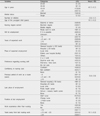Abstract
Purpose
The purpose of this study was to identify effects of a refresher program for inactive nurses on nursing professionalism and nursing clinical self-efficacy.
Methods
A pre-experimental design with one group pretest-posttest was used. The refresher program consisted of 150 hours and was provided to inactive nurses who were recruited from a refresher program at S institute. Eighty inactive nurses participated in the study. Data were collected between June and November 2009. To evaluate the effectiveness of the refresher program, researchers explored participants' nursing professionalism and nursing clinical self-efficacy through self-evaluation questionnaire before and after the refresher program.
Figures and Tables
References
1. Ahn EK. (A) model for clinical nurses' self-efficacy and work performance. 2000. Daejeon: Chungnam University;Unpublished doctoral dissertation.
2. Alden KR, Carrozza MA. The north carolina AHEC self paced RN refresher program: An evaluation of the first two years. J Contin Educ Nurs. 1997. 28(1):14–19.

3. Bandura A. Social foundations of thought and action: A social cognitive theory. 1986. Englewood Clifffs, N. J.: Prentice-Hall.
4. Bernardo LM, Burns HK, Hoffmann R, Dailey J, Hornyak T. The fast track back to registered nurses employment. Nurse Educ Today. 2009. 29(1):124–127.

5. Boo EH. The Effect of self-efficacy promoting program on the new staff nurse's self-efficacy and organizational socialization outcome. 2006. Seoul: Yonsei University;Unpublished doctoral dissertation.
6. Byeon YS, Kim M. Re-employment experience of nurses who have left the profession. J Korean Acad Nurs. 2008. 38(5):768–778.

7. Cho EJ. Relationship between professional self-concept and burn-out of nurses in geriatric hospital. 2006. Busan: Kosin University;Unpublished doctoral dissertation.
8. Cho JK, Lee SY, Kim EJ, Song HJ, Youn KJ. Nurse workforce challenges: System and policy. 2005. Seoul: Korea Institute for Health and Social Affairs.
9. Choi YH, Rhee HY, Kim HS, Kim SS, Park KW. A survey study of nursing diagnosis use in clinical practice. J Nurs Acad Soc. 1996. 26(4):930–945.

10. Chu Y. Analysis of status in active and inactive nurses according to field. 2006. Retrieved May 10, 2010. Seoul: The Korean Research Institute for Nursing Policy, Korean Nurses Association;from http://www.koreanurse.or.kr.
11. Han SS, Kim MH, Yun EK. Factors affecting nursing professionalism. J Korean Acad Soc Nurs Educ. 2008. 14(1):73–79.

12. Hammer VR, Craig GP. The experiences of inactive nurses returned to nursing after completing a refresher course. J Contin Educ Nurs. 2008. 39(8):358–367.

13. Hampton GM, Hampton DL. Relationship of professionalism, rewards, market orientation and job satisfaction among medical professionals: The case of certified nurse-midwives. J Bus Res. 2004. 57(9):1042–1053.

14. Hawley J, Foley B. Being refreshed: Evaluation of a nurse refresher course. J Contin Educ Nurs. 2004. 35(2):84–88.

15. Ji EO. A study on field adaptation of new nurses. 2009. Seoul: Ewha Womans University;Unpublished master's thesis.
16. Jung MS. A study on the correlation among new graduate nurses' OSCE results, self-efficacy and competence. 2008. Seoul: Sungkyunkwan University;Unpublished master's thesis.
17. Jung SH. The ethical attitude related to DNR and the views on nursing profession among nurses. 2007. Gangneung: Kwandong University;Unpublished master's thesis.
18. Kim MA, You SJ, Kim MJ, Kim ES. A survey of nursing activities in small and medium-size hospitals: Reasons for turnover. J Korean Clin Nurs Res. 2009. 15(1):149–165.
19. Kim MH. A study on the factors affecting the view ot nursing as professionalism. 2008. Seoul: Kyung Hee University;Unpublished master's thesis.
20. Kim MR. Clinical Nurses' professionalism, nursing performance and intention of retention. 2008. Seoul: Hanyang University;Unpublished master's thesis.
21. Kwon YM, Yeun EJ. A correlation study on nursing professional values, department satisfaction, sociality, self-esteem among nursing students. J Korean Acad Nurs Adm. 2007. 13(3):285–292.
22. Lee SY, Choi JA, Lee JH. A study on military nursing officers' nursing professional values, job satisfaction, and nursing performance. J Mil Nurs Res. 2008. 26(1):104–122.
23. Maran NJ, Glavin RJ. Low-to high fidelity simulation-a continuum of medical education? Med Educ. 2003. 37(1):22–28.
24. Mark S, Gupta J. Reentry into clinical practice: Challenges and strategies. JAMA. 2002. 288(9):1091–1096.
25. McLean TM, Anema M. Reduce the nursing shortage: Help inactive nurses return to work. J Contin Educ Nurs. 2004. 35(5):211–215.

26. Morris AH, Faulk D. Perspective transformation: Enhancing the development of professionalism in RN-to-BSN students. J Nurs Educ. 2007. 46(10):445–451.

27. Oh Y. The demand and supply of registered nurses in korea and policy recommendations. Health Soc Welf Rev. 2008. 28(1):68–86.





 PDF
PDF ePub
ePub Citation
Citation Print
Print






 XML Download
XML Download